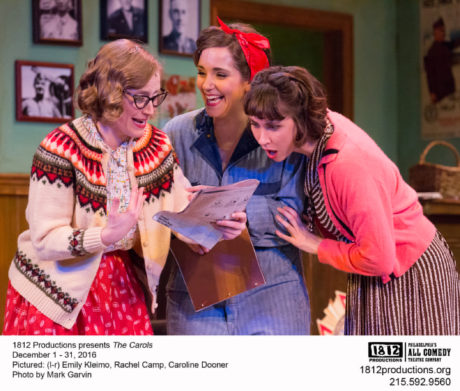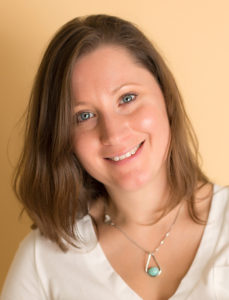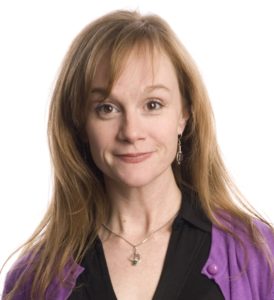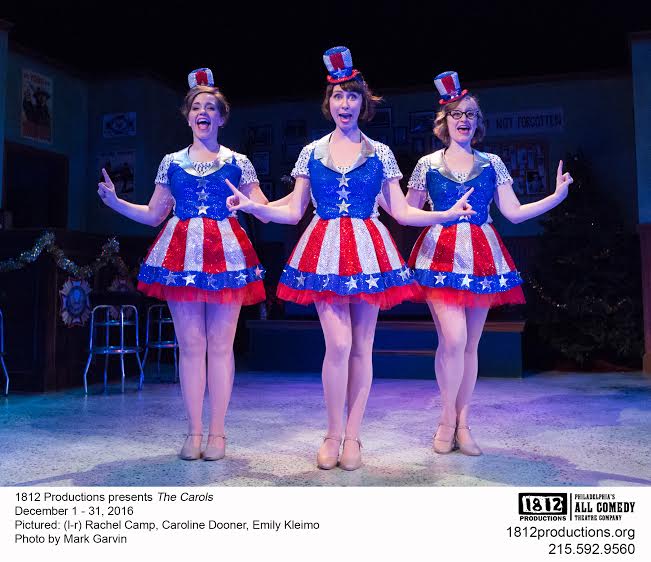1812 Productions’ Producing Artistic Director and Co-Founder Jennifer Childs teamed up again with musician Monica Stephenson, a long-time friend and former colleague at the company, for this year’s funny and heartwarming holiday show. The Carols, an original world-premiere musical comedy, with book, lyrics, and direction by Childs and music by Stephenson, weaves the story of three singing sisters during WWII, determined to put on the local VFW’s annual performance of Dickens’ A Christmas Carol, despite the wartime absence of men for the key roles.

I met with Jen–who just won the 2016 Barrymore Award for Outstanding Leading Actress in a Musical in October for I Will Not Go Gently–at 1812’s South Philly offices. Monica, who is back in her native Pittsburgh, joined us on speaker phone, to discuss the concept and background for the show, their mutual interest in the era of the 1940s, and their desire to create a work with a female perspective that would appeal to all audiences.
Deb: You two have known each other for over a decade. When and how did the idea for this collaboration come about?

Monica: Yes, I became an administrator at 1812 Productions about ten years ago. I served for about five years as Education Director, Box Office Manager, and as Jen’s assistant. All the while, I was writing music and performing in a band.

Jen: I got to know Monica as a musician while she was here with us, so earlier this year I had the idea for this show and thought of only one person! The Carols is specifically written for a female voice, with a story that revolves around the arguments and agreements of three sisters who sing together, like The Andrew Sisters did. The challenge was not just to get the harmonies, but the intentional discord at times, which would come together again.
Monica: Yes, the musical dissonance and resolve in the harmonies echo the sister’s relationship. As far as the collaboration goes, I’m always a “yes!” to Jen, and was very happy to be back working with her and 1812.
Jen: We started talking about this in the spring, and then began writing in earnest around June. My initial idea was to write a play with some songs, but then it evolved into a full musical, with more and more songs!
Why is it important to you, and for the public, to consider themes that focus on women?
Jen: Good question.
Monica: Our current political climate is proof enough.
Jen: I feel like they are voices we don’t hear often enough, with so many years of white men dominating the theater. Tennessee Williams wrote beautifully for women, but not all men do, and not all women are tragic heroines. Women, like men, are funny and ferocious and complicated, yet I’ve always noticed the dearth of roles for women that are hysterically funny.
Monica: We need more women in positions of leadership and decision-making with theater companies. We need more composers and writers because they make the female characters so much richer by drawing on their own experiences.
Jen: There’s still the thought that a play by a woman is a ‘woman’s play.’ But NO, they’re human plays. And just because the cast of The Carols is largely women doesn’t mean that the men in the audience aren’t laughing their asses off! I think we’ll know that we’ve achieved something when there isn’t that kind of distinction made, and there isn’t the feel of tokenism in the hiring and casting of women in plays that are about people.
Why did you choose the ‘40s as the time period for the show? Is this strictly a piece about American history, or are there parallels with our current time?
Jen: I chose the ‘40s for a couple of reasons. There had to be a reason why these women were by themselves, with few men around, so during the war was a perfect fit, as was the relationship to The Andrew Sisters. Also, there was the idea of a time of intolerance, both then and now. In the show, there’s a Catskills’ comic who’s Jewish, and one of the other characters has to get over the sisters casting him in A Christmas Carol. One of the main points of the show is expanding the idea of community.
Monica: I look at the ‘40s as a nostalgic time. When you see images from the period, it looks like a dream world, with faded pictures of Rosie the Riveter and Technicolor movies. Christmastime is also filled with nostalgia, with memories of childhood and spending the holidays with family.
Jen: I knew this would be a memory play, so I set it in the past, in a more ‘innocent’ time. Also women were going to work during the war, to fill the jobs that the men would normally have been doing if they were not away serving in the armed forces. Of course when they returned, the women were kicked out and sent back home. I thought it was interesting to look at that as maybe sowing the seeds for the feminist movement.
What do you love most about the ‘40s?
Monica: Big Band music and many vocal standards we know today were written during this time! I delved into it in high school and fell in love with it, it’s so dense musically.
Jen: That, and swing dance, and the fashions, and Bing Crosby! He turned out not to be such a nice guy, but if you can separate the art from the artist . . .
Monica: No one could croon like Bing Crosby!
Jen: My mother had a collection of old 78s, including his Christmas album. I accidentally stepped on it and broke it, and I don’t think she’ll ever forgive me!
Monica: The photographs I’ve seen of my grandparents were from the ‘40s, so I feel a very personal kinship with the period. There’s one that I always remember, of my grandmother and great aunts–actually there were three of them, as in The Carols—and they looked really happy, in spite of what was happening in the world.
Along with those you mentioned, who and what were your main influences for the music and design of the show?
Monica: I took a little from everywhere. Of course The Andrew Sisters and Boswell Sisters were the main inspiration. Also a little from Kurt Weill, who was a contemporary of the period, but not all of the songs have a ‘40s style, some are more contemporary. I’m a big fan of Stephen Sondheim and Jason Robert Brown. I’m sure they seeped in there.
Jen: Karen Getz did the choreography, which references the swing dance moves of the period. Lance Kniskern did the set and Janus Stefanowicz did the costumes. We didn’t want the design to look like a clean theatrical version of the ‘40s, we wanted it to look real, so, for example, the actresses curled their own hair, just as real women would have done at the time. We wanted the entire set to have that kind of nostalgic feel, so I had the idea of a snow globe—a little world in a little bubble with music, that you keep on a shelf to remember. There are times in the show when the cast is singing and moving around in what feels like snow-globe fashion. When I mentioned the idea to Monica she agreed; we were both on the same page with that.
Monica: Jen said that so beautifully; I’ll say what she said!
Did you have specific people in mind for the roles when you were writing them, or did you do a casting call and auditions?
Jen: The play evolved, and so I auditioned all of the younger ladies [Rachel Camp, Caroline Dooner, and Emily Kleimo as the Carol sisters], because I didn’t know them as well. I didn’t originally write for Mary [Martello, who plays Miss Betty, the grumpy landlady at the VFW], but once the show was cast, I started writing and revising it with her in mind, as I did with Tony [Anthony Lawton, in the role of the comic Mel]. They teach me a lot about the characters.
Monica: In the auditions, we had the actors make a harmony for the melodies; that made a big difference with casting. We also auditioned in trios, because it was important to hear how they formed harmonies together. And I was personally excited to write a song for Mary!
How do you see these female characters? Do they share any personality traits with you, as their creators?
Jen: There’s a little of me, and also my sisters—I’m one of three girls in my family–in each one. But they’re their own creatures, and there’s also a lot of the women playing them in the characters.
Monica: I agree, there’s a little bit of everybody.
Jen: And there’s a little bit of Scrooge!
What do Tony Lawton and his male character bring to the show?
Jen: He can do anything! He’s an amazing collaborator and he asks smart questions. His character Mel brings this outside exotic energy into the VFW hall. He’s a combination of Mel Brooks, Tom Shotkin, who comes to my house for Christmas every year [1812’s Stage Manager, who also writes and performs, appearing regularly as Uncle Shotsie], and my grandfather, who had that sense of humor. Tony can do the funny, and the soul; that’s what I love about him.
What do you find most rewarding about writing new work, and specifically about musicals?
Monica: It’s hard to explain, but it’s so satisfying to have the notion of where you want the music to go, and then to have it work. But I guess that’s true for everyone.
Jen: I’m always interested in magic and heightened reality, which is why I love comedy and music. Music gives permission for flights of magic; as one of the characters in The Carols says, “It’s a past where there’s a piano always in tune.” I make up songs all the time, I’m always singing to myself.
Monica: It’s what you want to say when you don’t have the words to say it; there’s an emotional truth to music. Often memories are associated with songs.
Yes, people always associate the music of the time and the songs that were playing with important life events. Music also seems to trigger memory, because most of us find it easier to remember song lyrics than the same amount of words or numbers that aren’t set to music.
Jen: Yes, there’s something about music that opens up our minds and emotions.
Monica: Yes, the same goes for laughter! I also want to acknowledge our Musical Director TJ Harris, who plays the limping piano player Teddy in the show. It’s 100% necessary to have patience with a new work, and—pardon the pun—he’s been instrumental! He should get a lot of work in Philadelphia after this.
Jen: I say, “Hear, hear!”
Do you have any plans for The Carols after the Philadelphia run, or for any future collaborations between the two of you?
Monica: Hmmmph.
Jen: It’s our hope that it will be done in other places–not necessarily our own production—and have a life in the regional theater scene. And yes, we both said “Let’s do this again. Something on ice!”
Monica: I’ve often felt like Jen is in my head, like with the whole snow-globe idea. We’re both in the same place at the same time. She just gets it.
Thank you, Jen and Monica, for taking the time to tell us about your creative process for The Carols, and for spreading laughter and good will this holiday season and always!
The Carols plays through Saturday, December 31, 2016, at 1812 Productions, performing at Plays & Players Theatre – 1714 Delancey Street, Philadelphia, PA. For tickets, call the box office at (215) 592-9560, or purchase them online.
Rehearsal video of “Soon (A Christmas Yet to Come)” with Caroline Dooner and Emily Kleimo.





